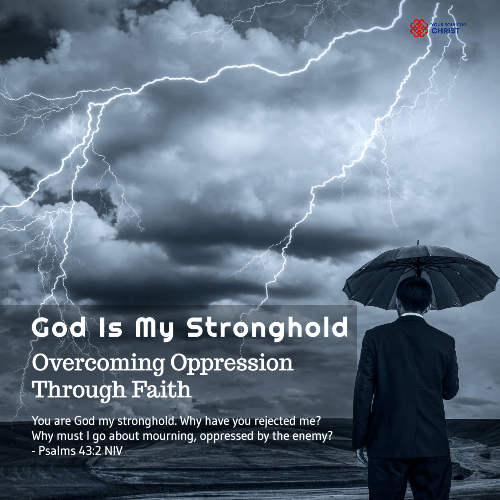You are God my stronghold. Why have you rejected me? Why must I go about mourning, oppressed by the enemy?
Psalms 43:2 NIV
In this verse, the psalmist offers a profound declaration in a moment of distress: “You are God, my stronghold.” This simple yet powerful statement reveals a deep faith, even in the midst of despair. Let’s explore two key perspectives from this declaration.
The first, acknowledging God as God. The psalmist acknowledges Yahweh as the one true God. Despite his painful circumstances, he does not seek salvation elsewhere or abandon his faith. This steadfastness shows that his trust remains solely in God, not in idols or other gods. From this, we can learn an essential lesson: God is unchanging, and our perspective of Him should never waver. He is not just God on good days but remains God in every season of life—unchanged by our circumstances.
No matter what trials we face, we must never look for salvation or comfort in anything or anyone else. Yahweh is God yesterday, today, and forever. This truth should anchor us through every challenge, just as it anchored the psalmist.
Secondly, acknowledging God as personal. There’s a difference between acknowledging God as a deity and recognising Him as your God. Many people might recognise a higher power, but not everyone enjoys a personal relationship with God. For the psalmist, God is not only God but also his God, his personal stronghold, and source of strength.
This personal connection is vital. Just as a child has special access and privileges with their own father, so we, as God’s children, have access to Him. Without this personal relationship, it is impossible to claim God’s promises or receive His help, especially in times of trouble. The psalmist could confidently approach God because He knew God as his refuge and strength, not just in theory, but in reality.
Meanwhile, in his struggle, the psalmist boldly asks, “Why have you rejected me? Why must I go about mourning, oppressed by the enemy?” These questions are not accusations but a reflection of his deep relationship with God. He knows that when God is truly his stronghold, the enemy cannot oppress him or cause him to live in mourning.
The psalmist’s questions remind us that it’s natural, even for believers, to wrestle with difficult emotions and seek understanding in times of hardship. When life feels overwhelming, it’s essential to ask these questions. Meanwhile, we must hold on to the truth that God is with us.
Sometimes, as in the case of Job, hardships come not because of rejection but for reasons beyond our understanding. The key is to remain anchored in the knowledge that God is our stronghold, even when it seems otherwise. The psalmist is not calling out to an unfamiliar deity; he’s seeking the face of the One he knows intimately.
In this passage, we see both a powerful declaration of faith and a heartfelt cry for understanding. The psalmist reminds us that God is not only our God in good times but also our stronghold in seasons of trial. Even when we feel abandoned or overwhelmed, we can confidently turn to God, knowing He is unchanging and ever-present.
We must never forget that God’s nature and His relationship with us do not change based on our circumstances. Whether in moments of joy or in times of mourning, He remains our stronghold. Trusting Him doesn’t mean we won’t face challenges, but it assures us that we are not facing them alone.
In moments of uncertainty, let us, like the psalmist, hold onto the truth that God is our stronghold, and though we may question, we can always trust in His unfailing strength and protection.
